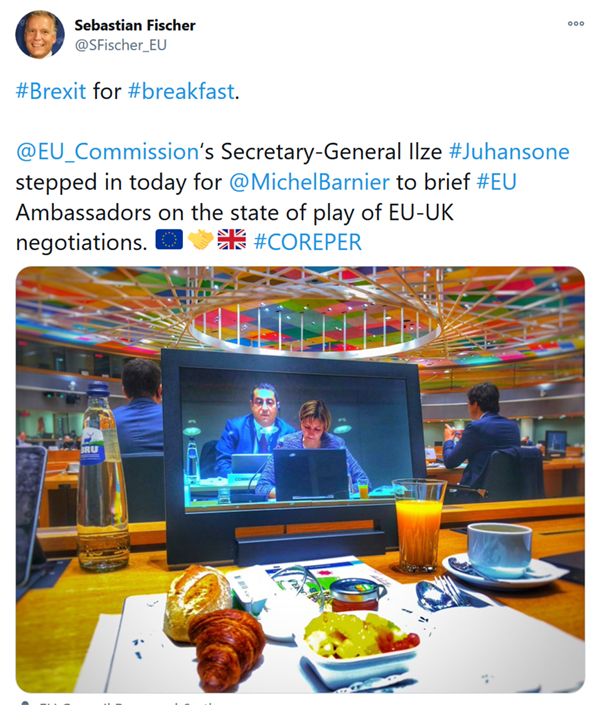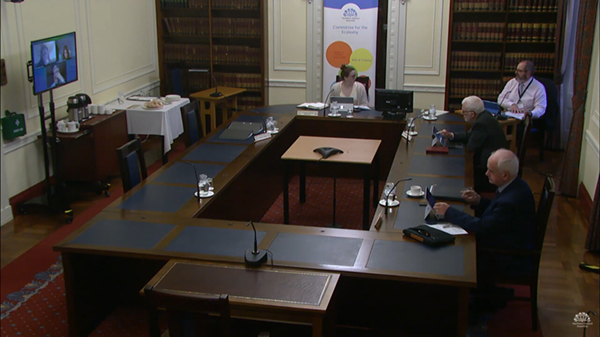Brexit Brief Newsletter
23 November 2020

Welcome to the 23 November 2020 issue of the Brexit Brief
Introduction
With 38 days to go until the end of the transition period, there appears to be little movement in the Brexit talks, which stalled last week when a negotiator tested positive for Covid-19. Parliamentary Committees at the Northern Ireland Assembly and at the Houses of Parliament heard evidence last week on the implications of Brexit for various sectors: policing, economy, food production and transport, EU funding, voluntary action, and human rights. The House of Lords continues its scrutiny of the Internal Market Bill.
Covid-19 hits the Brexit talks
The EU’s Chief Negotiator Michel Barnier tweeted on Thursday that a member of his negotiating team had tested positive for Covid-19. Barnier and the UK Chief Negotiator David Frost decided to suspend the high-level negotiations for a short period. David Frost tweeted his thanks to the European Commission for its help and support. Technical discussions took place over the weekend and this week Frost’s and Barnier’s teams continue their negotiations online.

@MichelBarnier on Twitter
On Friday, EU Ambassadors were briefed by the Secretary General of the European Commission, Ilze Juhansone. She told the EU27 diplomats that 95% of the agreement was complete, aside from the major hurdles of fisheries, the level playing field, and governance. However, some issues haven’t been completely signed off on and depend on the parties finding agreement on the level playing field – ‘nothing is agreed until everything is agreed’.

@SFischer_EU on twitter
Given that time is quickly running out for the deal to be finalised, translated, and ratified by 31 December, the idea of Provisional Application of the treaty has been mooted: the EU and UK would sign off on the deal and agree on its application from 1 January, leaving the other work around ratification to the New Year. There is also the question of the legal base of the agreement: unlike an ‘EU only’ agreement, a ‘mixed’ treaty which touches on national competences, would require ratification by national, and some regional parliaments - a much lengthier process.
After weeks of “slow progress”, European Commission President Ursula Von der Leyen said on Friday that recently there has been “better progress” and “more movement” in certain areas, for example, state aid. However, she said that there was still a lot of work to do and “quite some metres to the finish line”.
MPs hear from NI Representatives on Brexit
On 18 November, the House of Commons Future Relationship with the EU Committee heard from the NI Retail Consortium, Ulster Farmers Union, and Manufacturing NI. Aodhan Connolly of the NI Retail Consortium told the Committee £2.6 billion of agrifood produced in Northern Ireland goes to Great Britain, and 60% of this transits through Dublin Port. On the integrated supply chains between the UK, NI, and Ireland, he gave the example of a cottage pie which has nine border movements (north, south, east, west) before it becomes a finished product, and Baileys Irish Cream which has five such border crossings. Stephen Kelly of Manufacturing NI told MPs that "Northern Ireland’s business community will not be ready for 1 January. Quite simply, it does not have the detail nor the time required.”
Northern Ireland Justice Minister Naomi Long gave evidence to the Northern Ireland Affairs Committee on cross border cooperation on policing, security, and criminal justice. She told the Committee that if the UK and EU do not reach a deal, it is very important that bilateral arrangements are put into place with Ireland, to “bridge any gaps in capability”, noting that EU measures have underpinned cooperation on fighting crime on the island of Ireland.
NI Assembly Committees hear evidence on Brexit
On 18 November, the Committee for Economy heard from the Northern Ireland Council for Voluntary Action, whose representatives outlined the importance of EU funds for the sector. EU funding has been very important for voluntary, community, and social enterprise organisations, with the average annual EU funding to the VCSE sector reaching £17.7 million per year. NICVA outlined their concerns about lack of clarity and incompleteness of plans to replace EU funding programmes, noting there is huge uncertainty around the UK Shared Prosperity Fund intended to replace the European Social Fund and the Regional Development Fund. The representatives noted that time is running out to have replacement programmes designed, in place, and offering support to thousands of beneficiaries.

Committee for the Economy Meeting on Wednesday 18 November 2020
On 19 November, Colm O’Cinneide, Professor of Constitutional and Human Rights Law at University College London, spoke to the Ad Hoc Committee on a Bill of Rights on Brexit and its implications for human rights protections. He told the Committee that there isn’t anything about the Brexit process which, if well managed, would necessarily lead to a reduction in human rights protections. He explained that substantial parts of UK and Northern Irish law relating to equality and non-discrimination were generated by EU law. The European Court of Justice has been important in interpreting these. Following Brexit, much of NI’s equality and anti-discrimination law is now not locked in by the EU and reverts back to being ‘changeable’ UK law.
The Committee for the Executive Office heard evidence from the Special EU Programmes Body; representatives told the Committee that the PEACE IV Programme has a value of €269 million, while Interreg has a value of €283 million. Currently it is not clear what the impacts of Brexit will be in this area. The Withdrawal Agreement contains a commitment to the PEACE+ programme, currently at €650 million, and there is additional support from the UK and Ireland. Committee members noted the importance of such funding for community life in Northern Ireland, and the need for clarity on this funding for the future.
Internal Market Bill
The House of Lords continues to scrutinise the Internal Market Bill at Report Stage this week. Members are expected to consider how the UK Government works with devolved governments and market access principles. Last week the Lords voted in favour of an amendment to strengthen the Common Frameworks process, arguing that the Bill could undermine this process. This sentiment has been echoed by witnesses in the Common Frameworks Scrutiny Committee: last week Professor Nicola McEwen of the Centre on Constitutional Change, University of Edinburgh, told the Committee that a successful Common Frameworks programme would be given an opportunity to work, and space to see if this (specific and targeted) approach could work without the need for the broad-brush approach of the IMB.
Catch up with the Committees
- Wednesday 18 November, 10 am - Committee for the Economy - Departmental Written Briefing - DfE consultation (EU Gas Directive Amendment); Secondary Legislation relating to EU Exit; Briefing from NICVA - Update on the NI European Social Fund Programme
- Wednesday 18 November, 2 pm - Committee for Finance – Written Evidence - Westminster Hansard Report International Trade Committee: UK Freeports
- Wednesday 18 November, 2 pm - Committee for the Executive Office - Special EU Programmes Body - Oral evidence
- Thursday 19 November, 9.30 am - Committee for Agriculture, Environment and Rural Affairs - Future Agricultural Policy and Basic Payment Scheme Oral Evidence from DAERA and UFU; Written Briefing from Department – Secondary Legislation (EU Exit); EU Exit Preparedness Update
- Thursday 19 November, 9.30 am - Committee for Health - Departmental Briefing on Brexit; Legislative Consent Motion: Amendment to the Medicines and Medical Devices Bill; Consideration of draft report
- Thursday 19 November, 2 pm - Ad Hoc Committee on a Bill of Rights- Briefing by Colm O'Cinneide, Professor of Constitutional and Human Rights Law, UCL - Brexit and Human Rights
This Week at the Assembly
- Wednesday 25 Nov, 10 am - Committee for Infrastructure - Secondary Legislation relating to EU Exit (Public Service Obligations in Transport)
- Wednesday 25 Nov, 10 am - Committee for the Economy - Departmental Briefing - EU Exit Preparation and Transition Group: Business Readiness for the end of the Transition period
- Wednesday 25 Nov, 2 pm - Committee for The Executive Office - Brexit - Discussion with Oireachtas Committees; Oral evidence session with Junior Ministers on Brexit issues; Brexit - Evidence received from local councils - Consideration of draft report
- Thursday 26 Nov, 9.30 am - Committee for Agriculture, Environment and Rural Affairs - Common Framework for Fluorinated Greenhouse Gases and Ozone Depleting Substances - Oral Evidence from DAERA; Written briefing from DAERA on EU Exit legislation; Written Briefing from DAERA - EU Exit Preparation and Delivery Update
- Thursday 26 Nov, 9.30 am - Committee for Health - SL1 – The Food and Feed Hygiene and Safety (Miscellaneous Amendments) Regulations (Northern Ireland) 2020
- Thursday 26 Nov, 2 pm - Committee for Justice - SL1 The Carriage of Explosives (Amendment) (EU Exit) Regulations (NI) 2020



